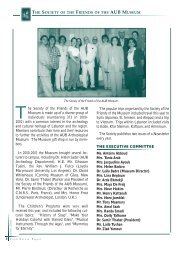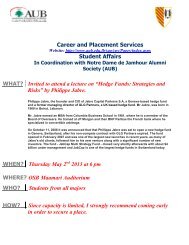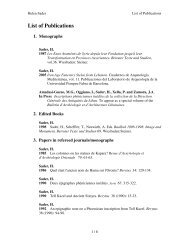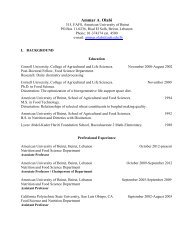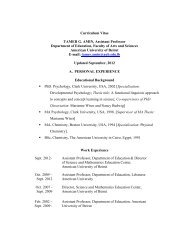The IX t h Makassed Medical Congress - American University of Beirut
The IX t h Makassed Medical Congress - American University of Beirut
The IX t h Makassed Medical Congress - American University of Beirut
Create successful ePaper yourself
Turn your PDF publications into a flip-book with our unique Google optimized e-Paper software.
proportion <strong>of</strong> patients in each cohort undergoing maximal interval cytoreductive surgery was<br />
associated with a 1.9 month increase in median survival time (95%CI=0.23 months–3.50 months,<br />
p=0.027). However, few centers around the world have adopted a more aggressive surgical<br />
approach to patients with extensive ovarian carcinomatosis, which include extensive upper<br />
abdominal surgeries. Until recently, however, no prospective RCT confirming the widely held<br />
belief that aggressive cytoreductive surgery should be the 1st step in the treatment.<br />
Role <strong>of</strong> interval debulking: In an effort to increase the proportion <strong>of</strong> patients with advanced<br />
ovarian cancer that are ultimately left with an optimal volume <strong>of</strong> residual disease, the concept <strong>of</strong><br />
interval cytoreduction has evolved into the treatment approach now referred to as neoadjuvant<br />
chemotherapy in which the initial attempt at cytoreduction is abandoned in favor <strong>of</strong> chemotherapy<br />
in order to reduce the extent <strong>of</strong> disease or improve patient performance A recent prospective<br />
European trial has confirmed that surgery performed following neoadjuvant chemotherapy is<br />
routinely shorter in time, associated with a better nutritional state preoperatively, less blood loss,<br />
shorter intensive care unit stays, shorter hospitalizations, reduced risk <strong>of</strong> peri-operative morbidity,<br />
and a higher rate <strong>of</strong> optimal resection. More importantly survival was not compromised.<br />
<strong>The</strong> role <strong>of</strong> surgery in recurrent disease: In properly selected patients, secondary aggressive<br />
debulking has a major impact on PFS similar, but to a lesser extent than in the primary setting.<br />
During this presentation, we will present convincing data on the role <strong>of</strong> aggressive surgery,<br />
including upper abdominal surgery, in the management <strong>of</strong> primary and recurrent ovarian cancer.<br />
TWIN PREGNANCIES FRENCH 2009 GUIDELINES<br />
Philippe Deruelle, MD<br />
Development <strong>of</strong> new technologies and dissemination <strong>of</strong> new scientific information and<br />
incorporation <strong>of</strong> research findings into practice are major challenges to health pr<strong>of</strong>essionals.<br />
Twin pregnancies are a high risk group which needs more intensive care than singleton. However,<br />
in France, the management may be widely different between centers and countries leading to<br />
inappropriate or usefulness practices.<br />
<strong>The</strong>refore in December 2099, the “College National des Gynécologues Obstétriciens Français”<br />
coordinated a National Consensus Conference in order to define, based upon the best evidence<br />
available, the standard care <strong>of</strong> twin gestation. <strong>The</strong> purpose <strong>of</strong> this guideline is to describe and,<br />
if possible, quantify the problems associated with twin management and to identify the best<br />
evidence to guide clinical care.<br />
Methods: fourteen questions were identified including epidemiology <strong>of</strong> twins, ultrasound diagnosis<br />
<strong>of</strong> chorionicity, screening for aneuploidies, management <strong>of</strong> monoamniotic, monochorionic<br />
diamniotic and dichorionic twin pregancies, prevention <strong>of</strong> spontaneous preterm birth, delivery and<br />
social and economic aspects <strong>of</strong> twin gestation. <strong>The</strong> MEDLINE database, the EMBASE database,<br />
the Cochrane Library, and the Guidelines published by foreign organizations or institutions<br />
such as Royal College <strong>of</strong> obstetrics and Gynaecology, <strong>American</strong> College <strong>of</strong> Obstetricians and<br />
Gynecologists, were used to conduct a literature search to locate relevant articles published.<br />
Additional studies were located by reviewing bibliographies <strong>of</strong> identified articles. <strong>The</strong> quality<br />
<strong>of</strong> evidence was evaluated and recommendations were made according to guidelines for<br />
assessing medical literature published by “Haute Autorité de la Santé”.<br />
101







